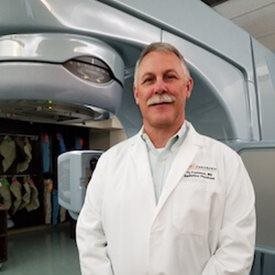 What is your medical background and what drove you to specialize in cancer care?
What is your medical background and what drove you to specialize in cancer care?
What drove me was a volunteer at a cancer center – the mother of my college roommate. She excitedly told me about a program that trained physicists at the cancer center where she volunteered. That really piqued my interest, so I connected with that physicist, and the rest is history.
What are your main responsibilities as chief medical physicist?
I focus on the technical side of the business, managing the technology, new procedures and protocols, etc.
What continues to drive you to stay with one organization for so long?
I have been with Texas Oncology for 21 years. I like the physicians I work with and the fact that Texas Oncology is a physician-led company. They are good people, in addition to being good physicians, and their general outlook is very upbeat and positive regarding cancer treatment. Additionally, I’ve always appreciated that Texas Oncology is technology and patient driven. We are all willing to go above and beyond for patients.
When it comes to cancer care, how do you think Texas Oncology most benefits patients and their families in the Gulf Coast community?
Even though we’re a large company with more than 175 sites of service, each site works as its own system, led by doctors and staff that live there and work in the community. There’s so much value in that community-based approach. The patients know the staff, their families, etc. The doctors live and play in the community. You’ll see them sponsoring a local baseball team, for example. Patients benefit from that small community feel, paired with high-quality care.
With so many years of service under your belt, how has the cancer care landscape changed over time?
The cancer landscape has become more technology driven. The challenge is to not let the technology be the only interface between us and our patients. We’ve gotten so much more accurate in our treatment regimens, with better results, but we’re dealing with nervous patients and we should never forget that human aspect of fighting cancer. So despite improvements in technology and the accuracy it provides, the people we’re treating will need to remain our number one priority.
What do you think the future of cancer treatment looks like?
We’re getting so much more information, and getting so much more accurate, so we’re able to really personalize our treatment for each patient. We’re able to say, “You’re coming in with a very specific type of cancer, and we’re coming up with a very specific regime, while still giving you great results.”
How would you describe the culture at Texas Oncology and what does that mean to your patients?
Our physicians and clinical staff take personal ownership in their roles, always putting their patients first.
What has working with cancer patients taught you about resiliency in the human spirit?
It’s incredible to see some of the things that these patients have to go through. I see it all the time – if they keep their spirit up, it’s amazing how it impacts their results. The ones who come in with that resiliency are the ones who do extremely well.